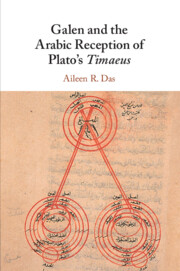Book contents
- Galen and the Arabic Reception of Plato’s Timaeus
- Galen and the Arabic Reception of Plato’s Timaeus
- Copyright page
- Dedication
- Contents
- List of Figures
- Acknowledgements
- Notes on Texts, Translations, and Transliterations
- Abbreviations
- Introduction: Plato’s Timaeus as Universal Text
- Chapter 1 Galen and the ‘Medical’ Timaeus
- Chapter 2 From the Heavens to the Body: Ḥunayn’s Ophthalmology
- Chapter 3 Al-Rāzī: The ‘Arab Galen’ and his Plato, New Disciplinary Ideals
- Chapter 4 Laying Down the Law: Avicenna and his Medical Project
- Chapter 5 Uprooting the Timaeus: Maimonides and the Re-medicalization of Galenism
- Conclusion: Medicine Disciplined
- References
- Index Locorum
- General Index
Introduction: Plato’s Timaeus as Universal Text
Published online by Cambridge University Press: 30 October 2020
- Galen and the Arabic Reception of Plato’s Timaeus
- Galen and the Arabic Reception of Plato’s Timaeus
- Copyright page
- Dedication
- Contents
- List of Figures
- Acknowledgements
- Notes on Texts, Translations, and Transliterations
- Abbreviations
- Introduction: Plato’s Timaeus as Universal Text
- Chapter 1 Galen and the ‘Medical’ Timaeus
- Chapter 2 From the Heavens to the Body: Ḥunayn’s Ophthalmology
- Chapter 3 Al-Rāzī: The ‘Arab Galen’ and his Plato, New Disciplinary Ideals
- Chapter 4 Laying Down the Law: Avicenna and his Medical Project
- Chapter 5 Uprooting the Timaeus: Maimonides and the Re-medicalization of Galenism
- Conclusion: Medicine Disciplined
- References
- Index Locorum
- General Index
Summary
The introduction asserts that the different causal, spatial, and comparative relations in Plato's Timaeus generated a model of knowledge that denies a strict separation between the disciplines. I contrast the dialogue's epistemic vision with the prevailing hierarchies of knowledge developed by ancient thinkers, including Plato himself, which ranks medicine below philosophy because it is a technē ('art'), deals with the body, and its practitioners were often enslaved or freedpersons. I argue that Galen's expansive refiguring of medicine's boundaries -- his 'boundary work' -- is part of a tactic to improve his profession's credibility and his own authority. After outlining my approach to science as a discursive practice, I consider how Galen's philosophical training enabled him to exploit the epistemic possibilities of the Timaeus, which seems to recognize that knowledge can be divided and bounded differently by each knower. I conclude by proposing that Galen’s own role in interfacing Arabic readers with the dialogue called for Arabic doctors and philosophers to reevaluate their own categories and taxonomies of knowledge, which had been shaped by late-antique epistemologies.
Keywords
- Type
- Chapter
- Information
- Galen and the Arabic Reception of Plato's Timaeus , pp. 1 - 29Publisher: Cambridge University PressPrint publication year: 2020

